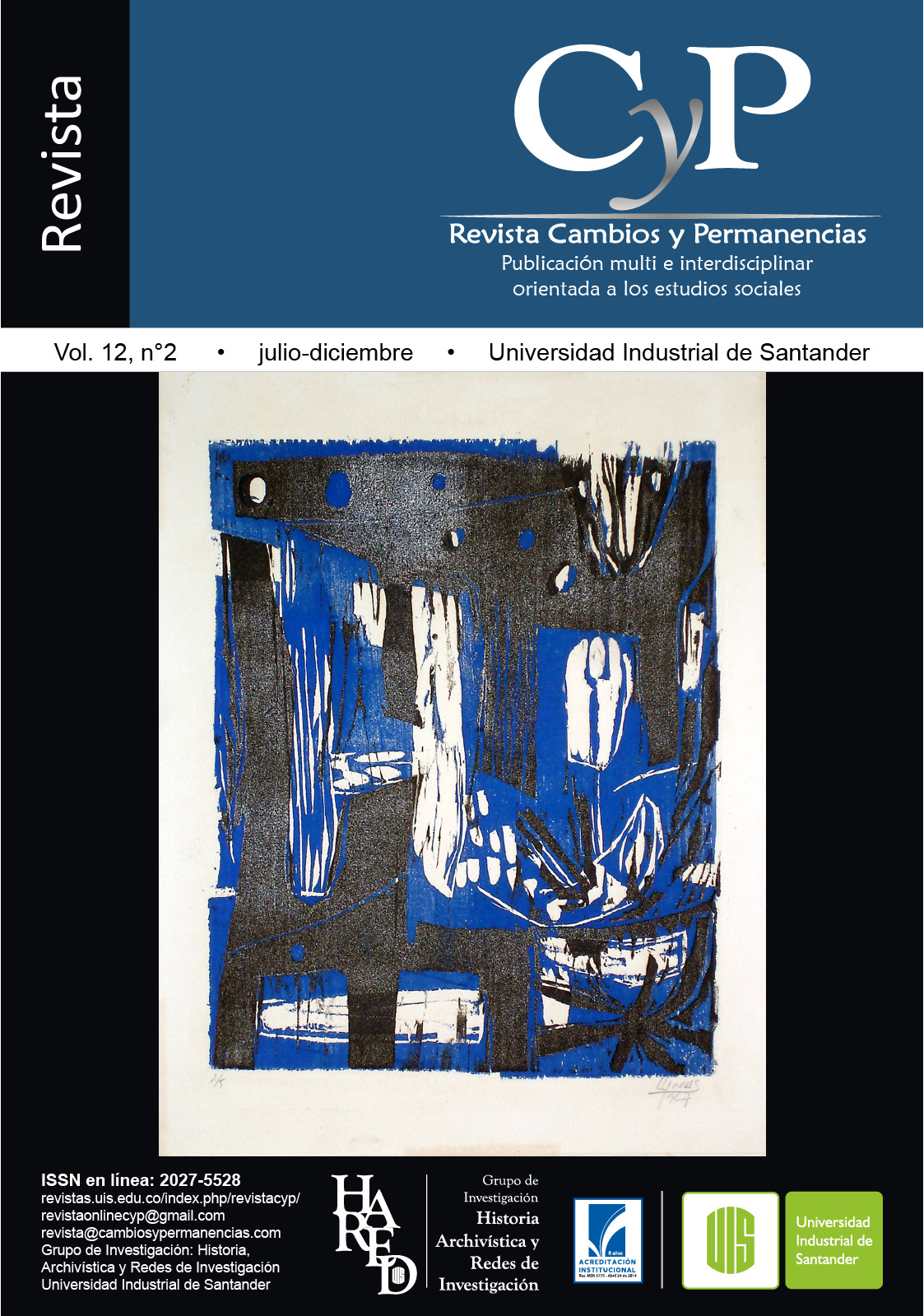Colonial Detachment in research with women in Southern Patagonia. From when methodology and militancy become traps of opacity
Published 2021-12-13
Keywords
- decoloniality,
- methodology,
- Patagonia,
- women,
- feminisms
How to Cite
Copyright (c) 2021 Revista Cambios y Permanencias

This work is licensed under a Creative Commons Attribution 4.0 International License.
Abstract
This work brings us both together to reflect on our research work within the framework of our doctoral theses that have in common the territorial context, the gender perspective, and the personal and political implications of the issues. One is about the practices and knowledge of prostitution in Río Gallegos and the other is about the working and living conditions of mining women in Río Turbio, both locations in Southern Patagonia. With this, we set out to do an exercise in awareness of our processes of formation of political subjectivity as feminist researchers who embrace critical theories and epistemologies, so that our practices allow constructions that recognize the doing-thinking of the subjects and the continuity of our critical thinking training processes.
We both set out to reflectively narrate the research itineraries from our first approaches to problems until to think about the contradictions, crises and transformations that we were unfastening. From this dialogue, we shared the analysis of our investigative processes in relation to two aspects: the first was linked to the interpellations that the territories make to us in contexts of displacement and the second with the proposals of decolonial doing to get rid of the methodologies and activist trajectories with which we began the investigation.
Downloads
References
- Referencias bibliográficas
- Behrens, R. (2012). Mujeres contadas. Prostitución, explotación sexual y trata de personas en el discurso periodístico de Santa Cruz. Revista Espacios, (34), 15-23.
- Carrasco Bengoa, C. (2006). La Economía Feminista: Una apuesta por otra economía. En M. J. Vara (Ed), Estudios sobre género y economía (pp. 29- 62). Madrid, España: Editorial Akal.
- Curiel Pichardo, O. (2015). Construyendo metodologías feministas desde el feminismo decolonial. En Otras formas de (re)conocer: Reflexiones, herramientas y aplicaciones desde la investigación feminista (pp. 45-60). España: HEGOA, Universidad del País Vasco.
- Espino, A. (2012). Perspectivas teóricas sobre género, trabajo y situación del mercado laboral latinoamericano. En V. Esquivel (coord.), La economía feminista desde América Latina: una hoja de ruta sobre los debates actuales en la región (pp. 190- 246). Santo Domingo, República Dominicana: GEMLAC – ONU MUJERES.
- Guarín Jurado, G. (2017). Desplazamientos epistemológicos contemporáneos en las ciencias sociales y humanas en América Latina. En S. V. Alvarado (et al), Las ciencias sociales en sus desplazamientos: nuevas epistemes y nuevos desafíos (pp. 27-38). Ciudad Autónoma de Buenos Aires, Argentina: CLACSO.
- Haber, A. (2011). Nometodología payanesa. Notas de metodología indisciplinada. Revista Chilena de Antropología, (23), 9-50.
- Haber, A. (2014). Interculturalidad epistémica y acción política en la arqueología poscolonial. En M. Rivolta, M. Montenegro, L. Menezes Ferreira, y J. Nastri (Eds.), Multivocalidades y activaciones patrimoniales en arqueología: perspectivas desde Sudamérica (pp. 47-65). Ciudad Autónoma de Buenos Aires, Argentina: Fundación de Historia Natural Félix de Azara.
- Ortiz Ocaña, A., y Arias López, M. I. (2019). Hacer decolonial: desobedecer a la metodología de la investigación. Hallazgos, 16(31), 147-166.
- Palermo, H. (2017). La producción de la masculinidad en el trabajo petrolero. Buenos Aires, Argentina: Biblos.
- Palumbo, M. M., y Vacca, L. C. (2020). Epistemologías y metodologías críticas en Ciencias Sociales: precisiones conceptuales en clave latinoamericana. Revista Latinoamericana de las Ciencias Sociales, 10(2). doi: 10.24215/18537863e076
- Preciado, P. (2011). Manifiesto contrasexual. Barcelona, España: Anagrama.
- Sandoval Álvarez, R. (2016). Cuadernos 1. Formas de hacer metodología en la investigación. Reflexividad crítica sobre la práctica. México: Grietas editores.
- Sandoval Álvarez, R., y Alonso Sánchez, J. (coords.) (2015). Pensamiento crítico, sujeto y autonomía. México D.F.: Ciesas.
- Torres Carrillo, A. (2014). Producción del conocimiento desde la investigación crítica. Revista Nómadas, (20), 68-83.
- Torres Carrillo, A. (2019). Pensar epistémico, educación popular e investigación participativa. Ciudad de México, México: Editora Nómadas.
- Torres Carrillo, A., y Torres Azocar, J. C. (2000). Subjetividad y sujetos sociales en la obra de Hugo Zemelman. Revista Folios, (12). Recuperado de http://biblioteca.clacso.edu.ar/gsdl/cgi-bin/library.cgi?c=co/co-014&a=d&d=HASH7259eb1969e92180a56d46.2
- Valiente Bertello, S. C. (2020). Hacia otra forma de conocer desde el saber -hacer de los sujetos. Revista Cambios y Permanencias, 11(1), 548-571.
